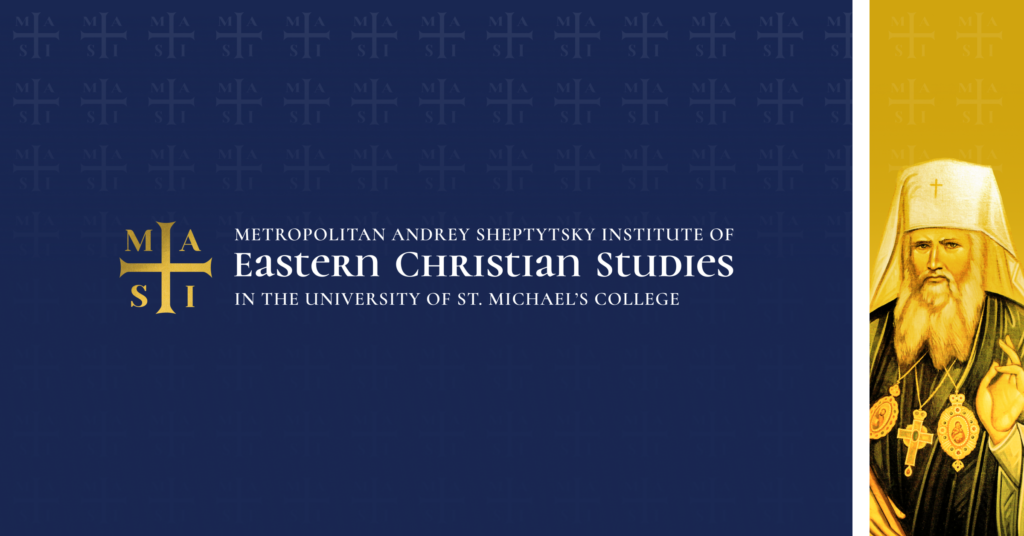Fr. Michael Bombak is a Ukrainian Catholic priest whose journey began in Edmonton with early education in the Ukrainian Bilingual Program and a teaching career before entering the seminary. His vocational discernment led him to Holy Spirit Seminary in Ottawa, culminating in his ordination as a priest in 2016. He served as Assistant Pastor at St. Josaphat Cathedral, then as pastor of the Vermilion District, and later at St. Stephen Protomartyr Ukrainian Catholic Parish in Calgary. Fr. Michael earned a Master of Theology from Newman Theological College, publishing his thesis on theological anthropology and contraception. He is currently a Doctorate in Ministry student through the Toronto School of Theology, University of Toronto and serves as the Chaplain and Programming Coordinator of the Metropolitan Andrey Sheptytsky Institute. He is married with five children and enjoys mountain climbing and hiking.
On the Road to Emmaus in the Gospel of Luke, the two disciples, grieving the loss of their Lord, while travelling, inadvertently meet Him along the way, and enter into a deeper relationship with Him through their minds being opened to recognize Him in the Scriptures and in Communion in the breaking of the Bread (Luke 24:13-35). With their hearts “burning within them” they travel through the night to share this good news with the other disciples only to discover that the news has already reached them!
This incredible story of encounter, consolation and conversion is the foundation of the new Metropolitan Andrey Sheptytsky Institute’s Discernment Program: “The Road to Emmaus Discernment Year.” Offered in cooperation with The University of St. Michael’s College Continuing Education Division, the program runs an entire academic year, from September to June, beginning with an opening retreat and closing with MASI’s annual popular theological conference “Study Days” to give participants a wider experience of the Church and a taste of deeper intellectual life.
Although originally envisioned as a program specifically targeted to local men discerning Holy Orders in the Ukrainian Greek Catholic Eparchy of Toronto, the initial meeting of the vocations commission concluded that the program would additionally be of great value to lay leaders. The program went from local in scope to broad with the help of the resources of The University of St. Michael’s College Continuing Education, which has leveraged online classroom delivery technology to support cohorts of the program in New Westminster, B.C., Calgary, AB, and several participants from Ontario and American parishes. In August, I had the joy of delivering an opening retreat for the good people of the New Westminster Eparchy at Holy Eucharist Cathedral, followed by another retreat here recently on campus at St. Michael’s College. One of the participants shared:
The Road to Emmaus opening retreat was very stirring for a young man hoping to discern and grow in prayer, love, and immersion in the beautiful spirituality of Eastern Christianity. All the speakers were full of humble wisdom and poured out such great knowledge on us that simply taking notes was not enough to absorb it all. This retreat has set the tone for the year ahead, and I look forward with great enthusiasm to all that is to come.
Often in ministry we can assume too much. When I was teaching grade eight English Language Arts one year, I asked my returning students to write a paragraph for me. After collecting these I realized my mistake- we should have started with sentences! While attending MASI Study Days in 2008 I remember Fr. Thomas Hopko, then Dean of St. Vladimir’s Orthodox Seminary, lamenting the fact that his seminarians were very excited to read the more mystical writings of the Philokalia but had not yet read the Gospel of Mark!
In ministry we can make this same mistake in rushing past Kerygma to get to deeper Catechesis, and designing programs tailored towards producing ministry skills before a relationship with Christ is established. When Christ calls the twelve in the Gospel of Mark He does so first “so that they might be with Him” and then to go out and preach and cast out demons (Mark 3:13-19).
This “Road to Emmaus” seeks to provide the context for encounter with Christ in the breaking open of the Scriptures and the breaking of the Bread in an active and intentional year of discernment and prayer as a community and in cooperation with the participant’s parish. By the end of the program, participants will have read 14 script,ural books in narrative order, providing them with an “overview” of salvation history, read most of “Christ our Pascha,” the Catechism of the Ukrainian Greek Catholic Church while benefitting from video lectures through the online resource “Becoming Byzantine,” and participated in two “Jesus Prayer Challenges” over the major fasting periods of the year. This discernment year is about encounter, and this encounter is fostered through prayer.
Animating the engagement with the riches of tradition is the commitment to spiritual discipline and intentional Christian love entailed in this program. It is my sincere hope that graduates of The Road to Emmaus—or better, successful pilgrims— will leave the program with a deeper understanding of Scripture, Church teaching and Spiritual practice, but most importantly, with a deeper hunger and longing for the Living God.
Read other InsightOut posts.


